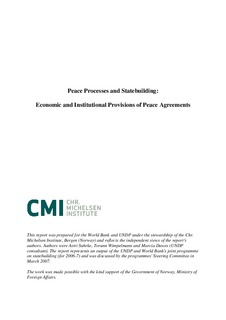| dc.description.abstract | This report originates in the growing international engagement in statebuilding and postconflict reconstruction during the past decade. The 2005 Paris declaration of the OECD referred to an emerging international consensus on concepts and approaches to fragile states, many of which apply to post-conflict situations. As part of this development, the World Bank and the UNDP agreed to strengthen their cooperation on statebuilding. A joint workshop on post-conflict statebuilding held in New York in September 2005, attended by reformers from a number of countries and agency officials, identified the principal issues and challenges in post-war transitions. The meeting was also the stimulus for a concerted effort by the Bank and UNDP to work together on a small programme of activities around the theme of statebuilding. In the Bank, this direction was further confirmed by the board of directors' endorsement in January 2006 of peace-building and statebuilding as central goals for the Bank's engagement in fragile states. The joint Bank/UNDP workshop in New York noted that peace agreements, if well constructed, could serve as a foundational roadmap for statebuilding in the transition period. Poorly designed peace agreements, on the other hand, provide a map with landmines implanted. While the nature of peace agreement have long been studied for their effect on the subsequent conditions of peace or war, less is known about which designs are most appropriate for building functioning and legitimate states. How, the workshop asked, could peace agreements provide a stronger, more comprehensive framework for managing the diverse transitions necessary for statebuilding? In line with this discussion, the Bank and UNDP decided that peace agreements would constitute one focus of their joint program on statebuilding. The present study was commissioned as a modest start for this undertaking, intended to (i) provide an overview of the relevant literature on peace agreements in | |
